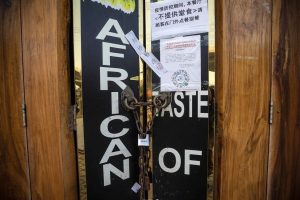By: Marshall Read
Journal of Global Rights and Organizations, Associate Articles Editor
GUANGZHOU, China – Okay, stop me if you have heard this one before: a national government using crisis response measures to suppress and discriminate against minority communities within that nation’s borders. No, it is not the United States this time; it is China. In a sequence of events that should, unfortunately, surprise no one, the Chinese government has persecuted Africans, trampling on the equal protection mandated by international law and Beijing’s stated policy of equal treatment.

Before the pandemic, the Chinese Province of Guangdong was officially home to some 14,000 African people. However, thousands more are expected to reside there undocumented. The city of Guangzhou, capital of Guangdong, has become a hub for African immigrants. One district, dubbed “Little Africa,” was populated by roughly ten thousand Africans. When the COVID-19 was still an epidemic in China, the African population dropped by nearly seventy percent. Most left or were evacuated by African Governments. Those who remained in China are still on their own.
It all began mere weeks after China closed its borders. 5 Nigerian individuals tested positive for COVID-19 in Guangdong Province. This was followed by false rumors that over 1,000 Africans in china had caught the disease. China ordered that all foreigners must submit to COVID-19 control measures. This kicked off a wave of COVID-19 suppression measures on African’s in Guangdong.
All of this happened during the Summer of 2020, while other parts of the world, including the United States, saw massive BLM demonstrations against police brutality. In response to international outcry, the Chinese government has insisted that China and Africa (yep, the whole continent) are friends, noting Beijing’s “zero tolerance” policy for discrimination. The response makes sense considering China’s participation in the International Convention on the Elimination of All Forms of Racial Discrimination. However, the reality of events in China is contradictory to those stated goals. The law may say “all foreigners,” but it only seems to be enforced against the black foreigners.
The government began forcibly testing all Africans in the region this past April. Police entered homes, either forcibly tested, or ordered residents to go to a hospital to get tested. Africans were also quarantined. Additionally, Africans are routinely being evicted and denied service throughout China.
Ade, a Nigerian student at Guangdong University, had just paid his University fees when his landlord evicted him. Police met him and his roommates as they frantically moved their stuff out.
Mohammed, a Tanzanian trader in Guangzhou, was forced out of his apartment and quarantined in his shop. He lived like this for months until the situation in Guangdong Province began to subside. Nonetheless, the circumstances are such that it will be challenging to continue as normal for either Ade or Mohammed, because now in China, the virus is inextricably linked to African immigrants.
Writing this in December of 2020, it appears as though the situation has mostly subsided. Despite being a space away from having a winning summer 2020 bingo card, China appears to have gotten away with its persecution of Africans. Despite the start of a return to normalcy in Guangdong Province, the damage has already been done. The Chinese government has continued the dark tradition of persecuting black people by tying their presence in China to the spread of COVID-19.
For further information, please see:
BBC – “Africans in China: We face coronavirus discrimination” – 17 Apr. 2020
Nikkei Asia – “China’s ‘Little Africa’ shrinks 70% as coronavirus leaves its mark” – 24 June 2020
Human Rights Watch – “China: COVID-19 Discrimination Against Africans” – 5 May 2020